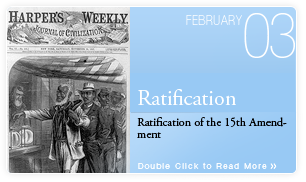Ratification of the 15th Amendment
In 1870, the Fifteenth Amendment (XV) to the United Constitution was passed, saying that the right to vote would not be restricted on “account of race, color, or previous condition of servitude.” As the Bill of Rights is a term referring to the first ten Amendments, the XV is the last of the Reconstruction Amendments, encompassing the XIII, XIV and XV Amendments. All passed in the wake of the Civil War, they abolished slavery, created Due Process, Equal Protection and Privileges and Immunities clauses, and extended the right to vote to African Americans. The first African American to vote after this was Thomas Mundy Peterson in a school board election that occurred on March 31 of the same year in New Jersey. In this period from 1865 to 1880, what is referred to as Reconstruction, there were more African Americans elected to political office than at any other point in America’s history, both measured proportionally and absolutely. By the 1890s, the enfranchisement of African Americans in the South had been vastly reduced thanks to literacy tests, poll taxes and other voter qualification laws. These came after President Rutherford B. Hayes withdrew the Federal troops that had been stationed in the South since the Civil War, allowing the Klu Klux Klan and other groups to intimidate and supress the large African American populations.

